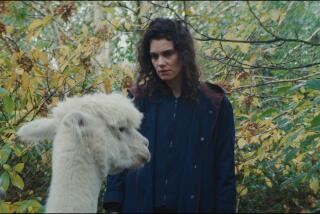Review: Vanessa Redgrave, Joely Richardson shine, but latest ‘Aspern Papers’ falters
- Share via
“The Aspern Papers” have been something of a family business for the Redgrave acting clan for more than half a century, and the new film version continues that tradition with a range of results.
It all started in 1959, when Vanessa’s father, Michael, did a stage adaptation of the 1888 Henry James novella about a deeply obsessive American’s quest for never-published letters of a long dead Romantic poet, letters in the possession of a now elderly British woman living in Venice who was once his lover.
Some 25 years later, Vanessa won an Olivier Award for playing the aged woman’s niece in a London production of the play.
Now, 35 years after that, Redgrave, at 81, is old enough to play that elderly party with conviction and elan, and her daughter Joely Richardson takes on the role of the niece.
It is a treat to see these women share the screen (they’ve done it before, in 1985’s “Wetherby” and even on an episode of TV’s “Nip/Tuck”) and a pleasure to report that they are both excellent. About the rest of the film, however, the news is not so good.
Though its literary plot wouldn’t seem to be ideal for the big screen, James’ work has in fact been made into a film four times previously, starting with a lurid 1947 production called “The Lost Moment” with Agnes Moorehead and Susan Hayward in the roles Redgrave and Richardson take on here.
Nothing daunted, French director Julien Landais has tackled the book for his feature debut after making a handful of shorts and doing a decade of commercials and music videos.
Co-writing the script with Jean Pavans and Hannah Bhuiya, Landais has made a version of “Aspern” that is too often uncertain and unconvincing despite the good work of his female stars. And when the actresses leave the screen and the film ventures into ill-advised flashback territory, things get shakier still.
The Aspern of the title is a celebrated writer (apparently based on Shelley) named Jeffrey Aspern who, we are told in voiceover, was “the most brilliant poet of his day, and the most genial and handsome of men.”
Telling us this is Morton Vint, a callow cocky American raggedly played by Irish actor Jonathan Rhys Meyers, who has done excellent work since coming to notice in Todd Haynes’ “Velvet Goldmine” but seems miscast here.
The world’s reigning expert on Aspern as well as an arrogant fop much given to dressing gowns and open-necked white shirts, Vint has come to Venice to track down Juliana Bordereau (Redgrave), once Aspern’s muse and lover and the woman he believes has a trove of Aspern’s letters in her possession.
Because Juliana is known to resist people like him, Vint resorts to a ruse. He uses a fake name and asks to rent rooms in her enormous Venetian palazzo on the dubious premise that he loves the horticultural potential of her decrepit garden.
As a woman of very great age, next door to decrepit herself, Redgrave is effortlessly commanding as this most iron-willed of matriarchs.
Wheeled around the palazzo in a mobile chair, dressed only in black except for a green eye shade that makes her look like the world’s oldest blackjack dealer, this is a woman who takes almost spiteful delight in saying just what she thinks no matter the consequences.
Regrettably, “The Aspern Papers” also flashbacks to Juliana in her youth (Alice Aufray), when she made merry with Aspern (Jon Kortajarena) and another young man referred to in the credits only as The Romantic Poet (Nicolas Hau.) To say that these sequences play like arty European commercials is to give those advertising spots a bad name.
Back in the present day, Juliana lives with Miss Tina, her niece, played by Richardson with considerable subtlety, allowing the character to start out hesitant and repressed but gradually develop her own agenda.
James’ theme of abhorrence toward the cult of personality comes through here despite the stodgy film making, as when Juliana asks Vint, “Do you think it’s right to rake up the past? The truth belongs to God.” It’s a strong moment in a film that does not have enough of them.
----
Rated: R, for some sex, nudity.
Running time: 1 hour, 30 minutes.
Playing: Laemmle’s Royal, West Los Angeles.
More to Read
Only good movies
Get the Indie Focus newsletter, Mark Olsen's weekly guide to the world of cinema.
You may occasionally receive promotional content from the Los Angeles Times.











